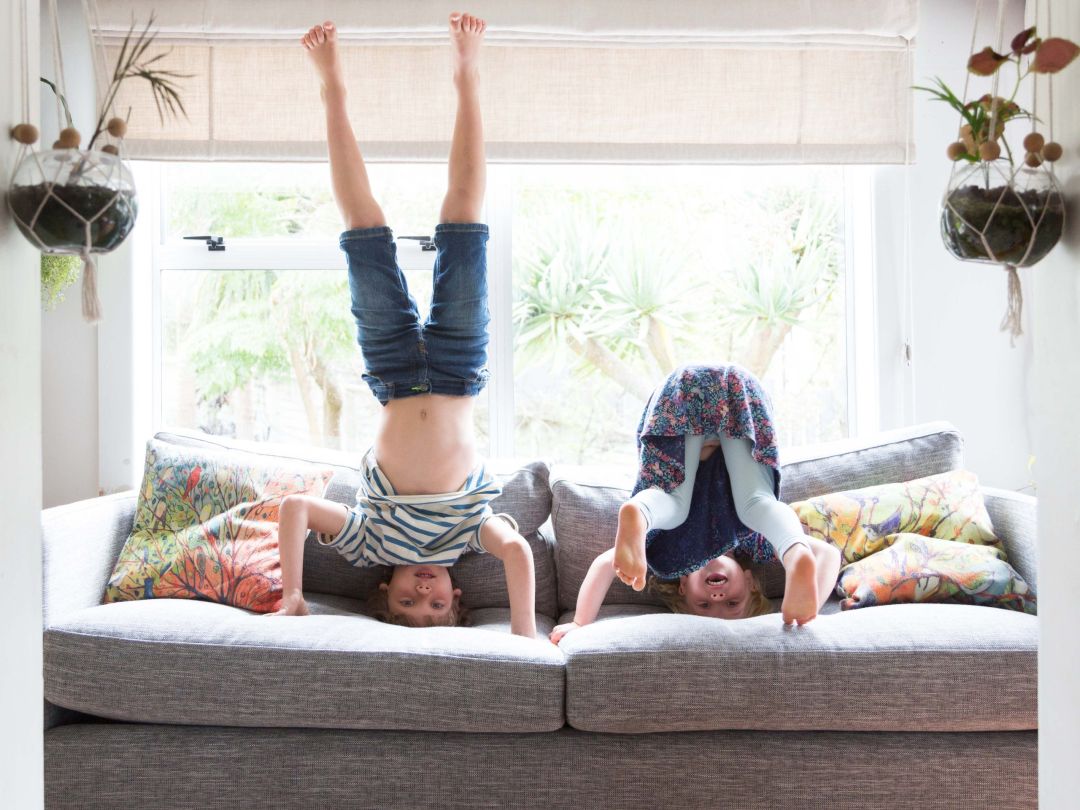My children are out of control
Our award-winning coach, Kim Morgan, speaks to a woman feeling overwhelmed and unable to get a handle on her daughters’ behaviour

5 minute read
Session 1: “Why can’t my girls behave like other children do? I’m at my wits’ end”
Toni* was late for our first session. She apologised profusely, then burst into tears, saying: ‘I’m at the end of my tether. My children are out of control and I don’t know what to do. My parents are babysitting this morning but, just before I left, the girls drew all over the cupboard doors, so I had to stay behind to help clean up.’ Toni paused for breath, sobbing her way through the story.
‘I feel like such a failure. Why can’t my children behave like others do? I see kids in the supermarket with their parents, just walking along beside the trolley – some even help with the shopping! I wouldn’t dream of taking my girls shopping as they would run riot. I am really embarrassed by them and ashamed of myself. I feel as though other families avoid asking us over for play dates. My husband blames me for being too soft and I blame him for not being there enough – it’s seriously affecting our relationship.’
‘How do you think all this has come about?’ I asked.
Toni told me that she had desperately wanted children, but she had suffered several miscarriages before she had her two girls, now three and four years old. They were so precious to her that she didn’t want them to suffer in any way and wanted to give them a wonderful life. She found it almost unbearable to tell them off, but Toni felt it was all going terribly wrong now, and they were running rings around her.
For homework, I asked Toni to think about her own childhood – the things she liked doing, happy memories, games she played and how she knew she was safe and loved.
Toni looked calmer when she arrived for the second session. She said she’d enjoyed thinking about her own childhood and it had made her realise that, despite not having many material possessions, she’d felt loved and safe. She realised that her parents had been ‘firm but fair’ and given her clear boundaries about what she could and couldn’t do. ‘I think I’ve lost my way with my children,’ she sighed. ‘I just wanted them to live in a world of unicorns, rainbows and marshmallows, but that is not possible. I am not preparing them for real life.’ Toni understood that she’d given her children too much power for their age, and that they were confused.
‘It’s not too late to change and I want to start now,’ Toni said with conviction. I could see she was not spending time looking back or regretting what she’d done, and was ready to make positive changes that would benefit her kids and the rest of the family.
As we talked, it became clearer to Toni that she had fallen into the common trap of giving all her attention to her children’s misbehaviour. We discussed how she could start to notice more the times when they were playing or being quiet, and praising them for it, instead of taking the opportunity to have a cup of tea and ignoring them. Toni left the session determined to praise and notice the behaviour she wanted from her children, and not their attention-seeking behaviour.
Session two: Showing a united front
By session three, Toni was beginning to make small but significant changes. She was giving the girls boundaries, more responsibility, praise and attention for good behaviour and consequences for their actions. She had spoken to her parents and her husband about them all pulling together to present a united front. Toni reminded herself that the outcome of her parenting style to date was that nobody liked being around her girls – not even their grandparents! She wanted them to grow up to be good people and that meant Toni was having to make some difficult changes to her own behaviour, too.
As Toni left the session, she said: ‘Do you know, I never really understood that I was responsible for bringing up two people who’d go out into the world as adults. Until now, I just thought I had children who I could play with and dress in nice clothes!’
Coaching exercises
Understanding the needs of children
Children have simple needs as they grow up. Meeting these will help them mature with a sense of self-worth, independence and confidence to go out into the world. Four key developmental needs were identified in 1980 by early-years pioneer, Mia Kellmer Pringle:
● The need for love and security
● The need for new experiences
● The need for praise and recognition
● The need for responsibility
This is a basic framework to use as a checklist. Without beating yourself up, ask yourself:
● Which needs are you meeting for your children? Make a list of the ways in which you meet these needs for each of your children.
● Which needs could you do more to meet? Perhaps there is one need you are meeting less than the others. Think of some new ways in which you could meet it. Don’t feel bad thinking about what more you could do; parenting is tough and you are doing your best. Think about who or what can support you to make changes.
2. Things your children can do
Spend a few minutes thinking about your daily routine. Make a note of things you do that your kids could get involved in, for example, helping you bake or setting the table. What do you do for them that they could tackle on their own? From your list, pick one thing for each child that you think would make a difference to you both, perhaps by freeing up your time, or giving them a sense of achievement. Think about how you’ll make this change, and what you need to do to prepare for it.
3. Taking care of yourself
The more you look after yourself, the better you can look after others and the happier you’re likely to be. You’ll also be giving your children some valuable messages about your worth and their own when they become parents. Take time to answer the following questions. You might want to do this exercise with your partner:
● What did you enjoy doing before becoming a parent?
● What else are you doing now, besides being a parent?
● How well do you think you are looking after yourself?
● What effect has having kids had on your relationship?
● What positive changes could you make? Who can help you do this?
*Name has been changed
Kim Morgan is managing director of Barefoot Coaching and co-author of The Coach’s Casebook
Image: Getty









